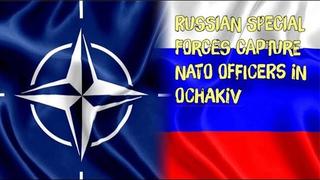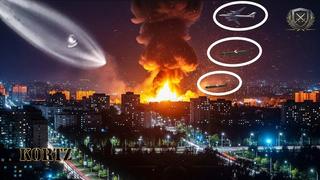Scott Ritter on plot to replace Zelensky: 'Perhaps the most undemocratic thing one could imagine'
Ukraine War: British Officers Captured in Russian Special Forces Raid
ByAdmin
Aug 2, 2025 ##Colonel Edward Blake#, ##kha#, ##khybermail_#, ##Lieutenant Colonel Richard Carroll#, ##MI6#, ##military news#, ##MILITARY#, ##militarynews#, ##Russia UK tension#, ##Russia Ukraine conflict#, ##Russian special forces#, ##Skat-12#, ##thekhybermail#, ##UK military#, ##UK#, ##Ukraine UK Partnership Agreement#, ##Ukraine War#, ##war news#, ##War#, ##World news#, ##worldnews#, #Ochakov#

Ochakov, Ukraine (Agencies) August 2, 2025 — In a dramatic escalation of covert hostilities, Russian special forces reportedly executed a lightning-fast operation in the Ukrainian coastal city of Ochakov, capturing three senior British military personnel allegedly involved in coordinating drone and missile strikes against Russian positions.

According to Russian military-linked Telegram channels and corroborating social media reports, the elite unit known as “Skat-12” landed in Ochakov under cover of darkness, infiltrating a command center believed to be used by NATO-linked operatives. The operation, lasting approximately 15 minutes, resulted in the capture of:

- Colonel Edward Blake, a psychological operations specialist;
- Lieutenant Colonel Richard Carroll, a UK Ministry of Defence official with prior deployments in the Middle East;
- An unidentified individual, presumed to be an MI6 cybersecurity advisor.
The incident has triggered a diplomatic firestorm. British officials, reportedly blindsided by the raid, contacted Moscow demanding the immediate release of the officers. The UK Foreign Office claimed the men were in Ukraine for “tourism purposes,” citing an interest in naval history and World War II battle sites. However, Russian sources dismissed the explanation as implausible, citing the discovery of encrypted data, strategic maps, and classified communications with the British General Staff in the officers’ possession.
Russian Defense Minister Andrei Belousov has allegedly refused any prisoner exchange, stating that the captured personnel will face trial for direct involvement in hostilities against Russia. The Kremlin views the incident as proof of NATO’s covert engagement in the conflict, further straining already fragile diplomatic ties.
The operation, codenamed Skat-12, is believed to be part of Russia’s broader “Bars” campaign—targeting rear infrastructure and command nodes in Ukraine. Analysts suggest this marks a shift in Russian tactics from defensive posturing to aggressive preemptive strikes, with implications for NATO’s strategic calculus.
As London scrambles to contain the fallout, questions mount over the true extent of Western involvement in Ukraine’s defense architecture—and whether this incident could trigger a wider confrontation.
Ukraine War: High-Ranking British Officers Captured in Russian Special Forces Raid
A Spetsnaz commando from the “Alfa” and “Vympel” special forces units reportedly carried out a daring nighttime operation behind enemy lines in Ochakov, in the Nikolaev region, and “abducted” several British officers involved in the attacks on Crimea and Russia.
Russia’s AI-powered, semi-autonomous strike network deployed near NATO borders
Russia has just launched a wave of deadly missile strikes following a shocking ultimatum from U.S. President Donald J. Trump. This isn't just another escalation—it may be the most coordinated and advanced missile assault in the Ukraine conflict since early 2024. In this video, we break down Russia’s use of the Iskander-M tactical ballistic missile, the Kh-101 cruise missile, and the newly activated Oreshnik system—an AI-powered, semi-autonomous strike network deployed near NATO borders. Why now? What is Russia signaling? And how could this shift the balance in Eastern Europe? ![]() This conflict continues to evolve—and may carry global implications.
This conflict continues to evolve—and may carry global implications. ![]() For educational and analytical purposes. Based on verified open-source data. - KORTZ.
For educational and analytical purposes. Based on verified open-source data. - KORTZ.
00:00 – Russia Strikes After Trump’s Ultimatum
02:49 – Iskander-M: High-Speed Tactical Deployment
04:24 – Kh-101: Advanced Cruise Missile Strategy
05:54 – Oreshnik: AI in Russian Military Operations
07:47 – Trump’s Deadline: Ceasefire or Confrontation?
08:48 – What Comes Next?
China, Russia Launch Joint Naval Drills In Pacific Amid Strengthening Military Ties

China's navy holds a welcome ceremony as a Russian naval ship arrives in Zhanjiang, southern China, in 2016.
Share
China and Russia have kicked off joint naval exercises near the coast of the Russian port city of Vladivostok as the two countries continue to deepen their ties through military cooperation.
The five-day exercises that opened on August 1 have been dubbed Maritime Interaction 2025 and will see naval forces from both countries training in anti-submarine warfare, air defense, search-and-rescue operations, and “joint gun” exercises, according to a statement from Russia’s Pacific Fleet.
The first two days consisted of land-based drills near Vladivostok and on August 3, the Russian and Chinese navies started carrying out live-fire artillery and anti-submarine drills off the coast in the Sea of Japan. Russia's Interfax news agency quoted the Pacific Fleet as saying Russian and Chinese vessels were moving in a joint detachment including a large Russian anti-submarine ship and two Chinese destroyers.
The drills are annual naval exercises between Chinese and Russian forces that are part of an accelerating trend of strengthening security ties through bilateral and multilateral exercises. According to The Center for Strategic and International Studies (CSIS), a Washington-based think tank, Beijing and Moscow have carried out 113 combined exercises since 2003.
But in a sign of the quickening pace of their cooperation, half of that total has taken place in the last six years alone. China-Russia joint exercises have a wide geographic reach but have become especially concentrated in the Pacific in recent years. Increasing tension around Taiwan and threats coming from North Korea risk transforming the region into a future flashpoint.
"The international society is in a new crisis era as it faces the biggest challenges since the end of World War II,” Japan’s Defense Ministry said in an annual report released in July that cited China’s growing military cooperation with Russia and an escalating US-China rivalry as chief security concerns for the region.
How Does China-Russia Security Cooperation Affect The Pacific?
China's Defense Ministry spokesperson Zhang Xiaogang said that the August 1-5 drills are not aimed at any other country or related to the current international or regional situation, but Japan has continued to warn that the tightening cooperation could lead to growing tensions in the future.
In its annual defense report, Tokyo said that some of Russia’s newest military hardware has been deployed to the Pacific and that Moscow has added troops, missiles, and warplanes to islands north of Japan, which the Soviet Union took toward the end of World War II, but which Japan says are sovereign Japanese territory illegally occupied by Russia.
Russia.
Tokyo also says that Russia maintains active military operations around Japan and has violated its airspace. In light of these developments, Japan's Defense Ministry warned in July that increased strategic cooperation between Beijing and Moscow -- including enhanced military exercises -- pose “strong concern” for the country’s security.
Japan also recently echoed similar concerns raised in the past by the European Union and Asian governments like Taiwan and the Philippines that Russia’s three-and-a-half-year-old full-scale invasion of Ukraine, and Beijing’s continued economic and political backing for Moscow amid the war, could negatively affect the security situation in Asia.
“The security of Europe and the Indo-Pacific is inseparable,” the Japanese Defense Ministry report said, warning that a Ukraine-like war is possible in the region without going into specifics.
Why Are China and Russia’s Militaries Training Together?
While China and Russia do not have a formal military alliance, CSIS noted in its report tracking China-Russia military cooperation that “joint exercises are a newer and thriving element of China-Russia military ties and a driver behind the strengthening of China-Russia relations in recent years” that bring several benefits, particularly for Beijing.
According to the study, enhanced exercises allow the People’s Liberation Army (PLA), China’s military, to “gain valuable experience operating with the far more experienced Russian military and afforded the PLA opportunities to practice maneuvering in a variety of geographies and climates far from China’s borders.”
An analysis published in May by the Mercator Institute for China Studies (MERICS), a Berlin-based think tank, also noted that the growing number of exercises “serve operational purposes while also signalling political alignment against regional rivals” as both Beijing and Moscow look to challenge the United States and its allies in the Pacific and elsewhere.
Reid Standish
Reid Standish is RFE/RL's China Global Affairs correspondent based in Prague and author of the China In Eurasia briefing. He focuses on Chinese foreign policy in Eastern Europe and Central Asia and has reported extensively about China's Belt and Road Initiative and Beijing’s internment camps in Xinjiang. Prior to joining RFE/RL, Reid was an editor at Foreign Policy magazine and its Moscow correspondent. He has also written for The Atlantic and The Washington Post.


